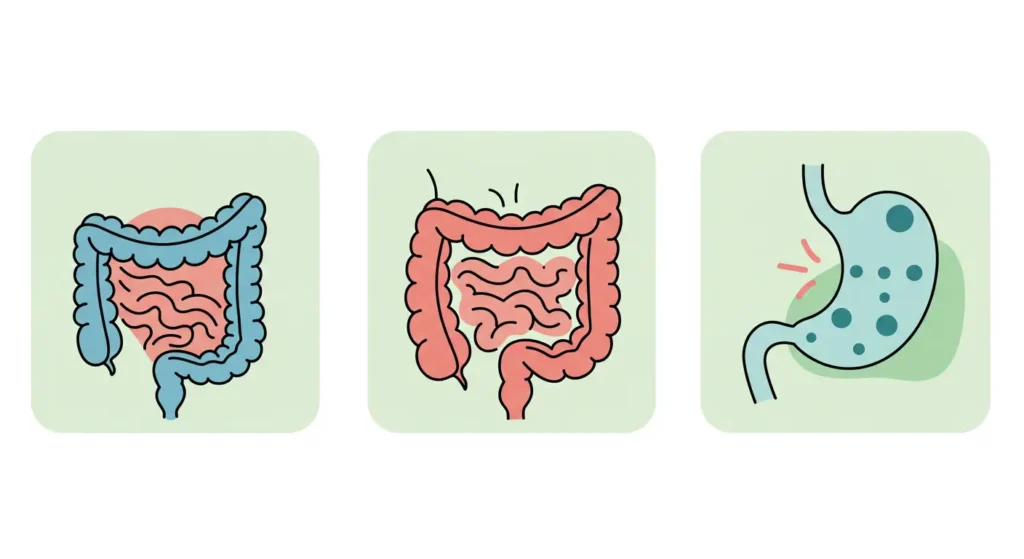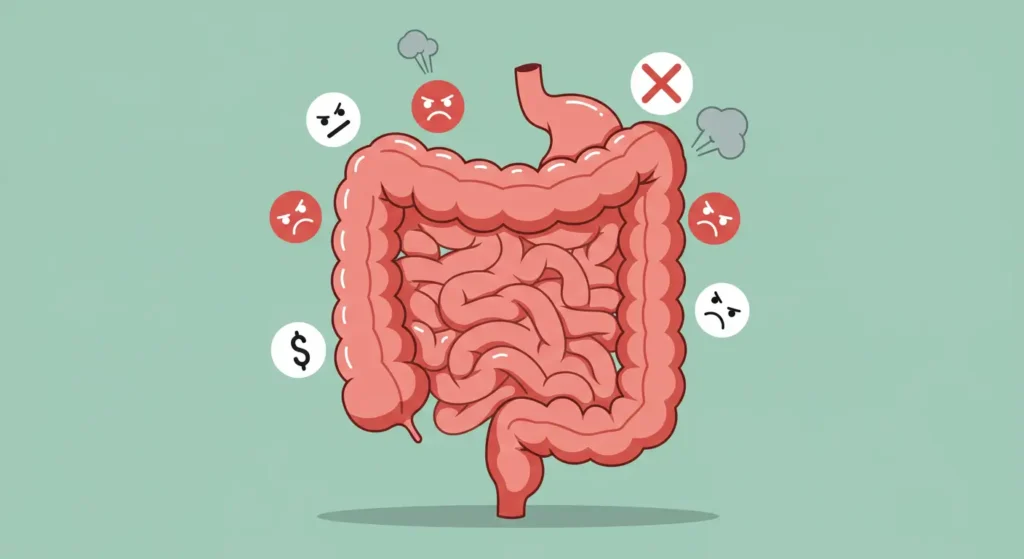
Introduction – Is Your Stomach Not the Same Anymore?
Have you ever caught yourself wondering, “Why does my stomach feel so different these days?” Maybe you feel bloated more often than not. Maybe certain meals leave you uncomfortable or running to the bathroom — or worse, avoiding food altogether out of fear.
If that sounds familiar, know this: you’re not alone, and it’s not “just part of getting older.” In fact, poor gut health is a hidden but common challenge for many people over 60 — and the signs are often subtle, confusing, or simply misunderstood.
This article will help you recognize the early signs of poor gut health after 60 — and more importantly, understand what your body is trying to tell you.
Why Gut Health Is So Important After 60
Your digestive system does much more than break down food. It plays a critical role in your energy levels, immune system, nutrient absorption, and even your mood. But as we age, our gut changes — and it often needs extra care to function properly.
After 60, your body naturally produces fewer digestive enzymes. The protective lining of your intestines may weaken, and the balance of healthy gut bacteria can shift. These changes can lead to symptoms like constipation, bloating, acid reflux, and even unexplained fatigue.
Worse yet, many people ignore these signs or assume they’re unrelated. But ongoing digestive discomfort is often your body’s way of saying: “Something isn’t right.”
The good news? Once you understand what these symptoms mean, you can take simple, natural steps to restore balance and feel like yourself again.
Top Signs of Poor Gut Health After 60

1-Persistent Bloating and Gas: A full, swollen belly after eating — even small meals — is often one of the first signs. This may be caused by poor breakdown of certain foods or an imbalance in gut bacteria that produces excess gas.
2-Constipation or Irregular Bowel Movements: If you’re going less often than usual, or your stool is hard and difficult to pass, your gut may not be processing or moving food efficiently. Irregularity is a red flag of slowed digestion.
3-Abdominal Pain or Cramps: Chronic or recurring stomach pain could indicate irritation, inflammation, or sensitivity to certain foods — often linked to conditions like IBS, SIBO, or food intolerances.
4-Frequent Heartburn or Reflux: That burning feeling in your chest or throat could be a sign of acid moving in the wrong direction — often triggered by weakened digestive function or imbalanced gut flora.
5-Unexplained Fatigue: When your gut can’t absorb nutrients efficiently, your energy takes a hit. Poor gut health often leads to chronic tiredness, even with a good night’s sleep.
6-Food Sensitivities or Intolerances: Suddenly reacting poorly to foods you used to tolerate well? This may indicate inflammation or damaged gut lining, which makes your digestive system more reactive.
7-Brain Fog or Difficulty Concentrating: The gut and brain are closely connected. Disruptions in gut health can cause inflammation that affects cognitive function — leading to memory issues, trouble focusing, and mental fatigue.
8-Frequent Illness or Weak Immune Response: Around 70% of your immune system lives in your gut. If you’re getting sick more often or taking longer to recover, a struggling gut could be the reason.
9-Mood Swings, Anxiety or Irritability: Imbalances in the gut microbiome can affect your emotional health. If you’re experiencing increased anxiety, low mood, or irritability, it may be linked to inflammation or gut-brain imbalance.
What These Symptoms May Be Telling You

These digestive symptoms are more than just annoying — they’re often your body’s way of signaling a deeper imbalance. Understanding the root cause behind these signs can help you take the right steps toward lasting relief and better gut health.
🔍 Disrupted Gut Microbiome: Your gut is home to trillions of bacteria — some helpful, some harmful. When this delicate ecosystem becomes unbalanced, the harmful bacteria can overpower the beneficial ones, leading to bloating, gas, fatigue, and even mood changes. These same disruptions may also interfere with sleep quality, which is why many seniors find breathing techniques helpful to unwind and rest better
🔥 Chronic Inflammation: Ongoing irritation in your digestive system can cause inflammation, which makes your gut lining more sensitive and reactive. This often results in food intolerances, cramps, and digestive pain — even from foods that once felt “safe.” And it’s not limited to digestion — inflammation may also impact other parts of the body like joints and knees, especially after 60.
❌ Poor Nutrient Absorption: When your gut is under stress, it may not fully absorb essential nutrients from the foods you eat. This can lead to low energy, weakened immunity, and even skin or hair changes over time — symptoms many people mistakenly attribute to aging alone.
🍞 Possible Trigger Foods: Many common foods contain FODMAPs — specific types of carbohydrates that can be difficult to digest for sensitive individuals. In older adults, the gut often becomes less tolerant, making it harder to process these foods without discomfort.
The good news? Once you begin identifying these underlying issues and learn how to support your gut properly, it’s possible to see improvements within days or weeks — not months or years.
When to Take Action — And Where to Start
If you’ve recognized even a few of the signs we mentioned, now is the time to act. Gut problems often start small — but left unchecked, they can gradually affect every area of your life, from energy and mood to sleep and nutrition. The sooner you take small steps toward healing your digestive system, the easier it becomes to reverse symptoms and feel like yourself again. And the good news is: you don’t need to figure everything out on your own. Many adults over 60 have found real relief simply by making a few daily changes — starting with how and what they eat. For example, sipping herbal teas throughout the day can help soothe digestion — especially when using a dedicated tea infuser bottle that makes the habit easy and enjoyable. If you want to learn more about safe, natural ways to support your gut, we highly recommend reading our guide below
👉 how-to-improve-gut-health-naturally-after-60 How to Improve Gut Health Naturally After 60 – Simple Daily Habits That Work.
This article offers practical tips, proven dietary approaches, and simple habits that can help you regain comfort, confidence, and control.
A Proven First Step: Gut Reset With the Low FODMAP Diet

One of the most effective and natural ways to calm an irritated gut is by temporarily removing certain foods that are known to trigger digestive symptoms — especially in adults over 60. This is exactly what the Low FODMAP diet does.
Originally developed by researchers in Australia, this approach focuses on eliminating specific fermentable sugars (FODMAPs) found in many everyday foods. For sensitive individuals, these compounds can cause gas, bloating, constipation, and abdominal pain.
The good news? Clinical studies show that up to 78% of people who follow a low FODMAP diet experience significant relief within just a few weeks. And many begin noticing changes in just a few days.
But figuring out how to start — and which foods to avoid — can be confusing, especially without professional help. That’s why we recommend a complete, beginner-friendly resource created by a licensed dietitian:
🎯 Want to Reset Your Gut Naturally — Without Guesswork?
The 14-Day Digestive Health Reboot is a step-by-step plan designed to help women over 60 reduce symptoms like bloating, constipation, and food fear — using proven science and simple guidance.
It includes:
- ✅ Low FODMAP meal plans (regular, vegetarian, and pescatarian)
- ✅ Shopping lists and food swaps
- ✅ Video tutorials and label-reading guides
- ✅ Restaurant cheat sheets and emotional eating support
Whether you’ve tried everything or you’re just beginning your gut health journey, this program makes it easy to take the first step — with confidence.
👉Click here to discover the 14-Day Digestive Health Reboot
Frequently Asked Questions (FAQ)
Q1: Is it normal to have digestive issues after 60?
Some digestive changes are common with age, but persistent issues like bloating, constipation, or abdominal pain are not something you should simply “accept.” These are signs that your gut may need more support — and can often be improved with simple changes.
Q2: I don’t have a diagnosis like IBS. Can I still benefit from a gut reset?
Yes. You don’t need a formal diagnosis to begin caring for your gut. Many people with occasional symptoms (or no clear condition) still benefit greatly from gentle strategies like the low FODMAP diet or other lifestyle changes.
Q3: Can improving my gut really help with energy and mood?
Absolutely. Your gut is connected to both your immune system and your brain. When your gut is healthier, many people report clearer thinking, improved mood, and better energy levels throughout the day.
Q4: Will I need to take supplements?
Not necessarily. Many people see significant improvements through dietary changes alone. Supplements can be helpful in some cases, but they’re not required to begin healing your gut.
Conclusion – It’s Never Too Late to Take Care of Your Gut
Your digestive symptoms are not random — they’re messages from your body, asking for support. Whether you’ve been living with discomfort for months or years, the right knowledge and a few gentle changes can make a world of difference.
It’s never too late to regain control of your gut health. Listen to the signs, take small steps daily, and remember: you don’t need to suffer in silence — or figure it all out on your own.
The path to better digestion, energy, and confidence can start today.

🛑 Disclaimer
This article is for informational purposes only and does not constitute medical advice. The content is based on publicly available sources and general knowledge regarding gut health after age 60. Always consult your doctor, dietitian, or a qualified healthcare professional before making any changes to your diet, medications, or health routine — especially if you have a diagnosed condition such as IBS, IBD, or other digestive disorders.
